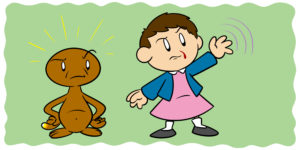The English language can do some trippy things if you let it. Take your eye off a sentence and, before you know it, it could become oxymoronic, tautological, or even malapropistic. For many types of writer, it’s enough to be able to avoid these foibles, but authors need more than that – they need to be able to turn them into tools.
That’s why, in this article, we’ll be looking at oxymorons, tautologies, and malapropisms. And since – at time of writing – it’s the festive season, we’ll end with a quiz to help hammer home what you’ve learned (or just let you show off what you already know).
Oxymorons
An oxymoron is a phrase that, in grammatical terms, renders itself impossible. It does this by containing contradictory elements. For example, the phrase ‘it’s my only choice’ – prefacing a word with ‘only’ implies it is unique, but a thing is only a ‘choice’ if there are other available options. In this way, it’s impossible (in grammatical terms) for anything to be your ‘only choice’, since the two words are mutually exclusive – it’s oxymoronic.
While grammatically objectionable, oxymorons are both useful and common. Humans are creative creatures, and so while juxtaposing two contradictory elements can cause confusion, it more commonly leads to a hybrid concept. It may be impossible, but we’ve all heard a ‘deafening silence,’ maybe even while ‘alone in a crowd’ after an ‘open secret’ has been revealed. Likewise, we all know to fear the ‘living dead,’ and in my ‘unbiased opinion’ their presence is cause to let out a ‘silent scream.’
Oxymorons stand out because they pose the kind of minor puzzle that human minds love to solve. If, however, that puzzle is resolved by fresh understanding, you’re likely to grab the reader’s attention more effectively than with a grammatically cogent sentence. If you tell me the eldritch gods of your fantasy universe have been chained away for ‘eons,’ I know they’ve been gone for a long time, but if you tell me it’s been ‘endless eons,’ you’ve added a tinge of the uncanny to their predicament.
Whether a thing is oxymoronic or not is mostly an issue of grammar. For instance, it’s almost impossible for a traditional snowman to catch on fire, but is the phrase ‘flaming snowman’ an oxymoron? Not really, since while our understanding of a snowman suggests this should be impossible, the definition of ‘snowman’ doesn’t quite rule it out. In contrast, a ‘huge inch’ is a clear oxymoron, since the whole point of the inch is that it’s standardized. The thing is, if you pick up a poorly made ruler, it’s entirely possible that you’ll find yourself looking at a ‘huge inch,’ whereas you’re never going to see that flaming snowman. The key is that if you saw the latter, that snowman would still technically be a snowman (at least in the short term), but if you saw the former, that inch isn’t actually an inch, since it broke the rules of its grammatical definition. They didn’t depict a huge inch, they just failed to depict an inch at all.
Accidental oxymorons can make authors look foolish, but they rarely happen by chance, so oxymoronic terms are mostly good for evocative writing and as a useful detection system for clichéd writing. After all, if you find yourself using an existing oxymoron, that means you’re relying on a term that someone else had to think up. That’s fine, but do you have anything more original that could do the same job?
Tautologies
A tautology is a phrase that unnecessarily repeats the same point. For example, if a character ‘says something out loud,’ they’re being tautological – if they said it, it was by definition ‘out loud,’ so that clarification is unnecessary. Tautologies tend to be equal parts grammatical and contextual – grammar insists that something which is said is said ‘out loud,’ but if your characters were just communicating via telepathy, suddenly the clarification is no longer tautological, even though the grammar didn’t change.
Tautologies are easy to miss, but they can grate on readers who notice them, creating a confusion in meaning that refuses to be resolved. If your character is a ‘military soldier,’ a ‘professional businessman,’ or a ‘qualified doctor,’ they’re being described tautologically, which is also true if they ‘smile happily,’ ‘whisper quietly,’ or are ‘absolutely certain.’
Unlike oxymorons, tautologies frequently happen by accident. When you’re trying to make something clear to the reader, it’s easy to repeat the same idea in an attempt at clarity. Of course, that doesn’t mean you can’t use tautologies to your advantage. Pitched right, they can be used for humor, especially in writing for young readers, who are more likely to accept the idea that piling up synonyms expresses intensity rather than redundancy. Judith Viorst’s Alexander and the Terrible, Horrible, No Good, Very Bad Day employs humorous tautology; it’s engaging in a way that the grammatically correct Alexander and the Terrible Day just isn’t.
Sometimes, of course, the repetition of a tautology provides its own context. In The Untouchables, Al Capone wants Eliot Ness killed, but what he says is, “I want that son of a bitch dead! I want him dead! I want him dead, I don’t care. … I want you to get this fuck where he breathes. I want you to find this nancy-boy Eliot Ness, I want him dead! I want his family dead! I want his house burned to the ground! I want to go there in the middle of the night and I want to piss on his ashes!” There’s no new information after the first sentence, but the repetition communicates a certain… enthusiasm.
Beta readers are the easiest way to catch your own tautologies, but being aware of this habit is a good way to prevent a lot of bad writing behavior stemming from the urge to overexplain. If you catch a tautology in your writing, ask why you felt the need to include it. Why didn’t you trust the simpler version of the term, and is there another version that can communicate everything you’re trying to say?
Malapropisms
A malapropism (also called a malaprop or Dogberryism) is a word mistakenly used in the place of one that sounds similar. For example, a person asking for the ‘specific standard time’ is likely using a malapropism for ‘Pacific Standard Time,’ and a person who fights bulls is a matador, but if you say ‘minotaur,’ you’re probably using a malapropism (although in fiction, all things are possible).
The malapropism is named for Mrs. Malaprop from Richard Brinsley Sheridan’s The Rivals, a character prone to using subtly incorrect terminology – for example, ‘illiterate him quite from your memory’ including a malapropism for ‘obliterate.’
We all fall into malapropisms on occasion – most often with idioms we’ve misheard and then accepted without question – but other than through painstaking reading, it’s almost impossible to catch your own. When used deliberately, however, malapropisms can really entertain readers, and there’s a long history of funny characters prone to malapropisms.
Without spoiling our deep dive into incongruity-resolution theory, and how it makes things funny (which you’ll find in Writing Funny Characters That Actually Make People Laugh), a lot of the humor in malapropisms comes from the reader’s understanding of what should have been said, and so the smarter you can make the reader feel, the bigger the laugh you’re likely to get. In contrast, be careful of those readers who don’t get the joke; if you’re laughing at a character who doesn’t know the right term, you may also be laughing at the readers who are in the same position.
In Only Fools and Horses, streetwise hustler Del Boy frequently misuses French terms when attempting to sound cultured. The art here is that most of the audience don’t speak French, but the malapropisms are so outlandish (and so utterly disingenuous) that they’re still instinctively amused by Del’s use of ‘mangetout’ (a sugar pea) to mean ‘no problem.’
The quiz!
So, that’s how you can tell an oxymoron from a tautology from a malapropism. Ready to put that theory into practice? Identify the linguistic tricks used in each of the following sentences (warning: in some cases, you shouldn’t stop at one, and beware the rare red herring!) Answers are included at the end of the article but, if you’re feeling confident, zoom down to the comments and share your answers before you check.
- Parting is such sweet sorrow.
- When this is done, I will go to the king, even though it is against the law. And if I perish, I perish.
- Our watch, sir, has indeed comprehended two auspicious persons.
- In my opinion, I think he’s a fool, but he’s adequate enough.
- I wanted to pick up my medicine, but they wouldn’t give it to me without my description. I said I wasn’t leaving without it, so that put us in dreadlocks.
- She’s an honest politician, but I haven’t trusted her since it came out that she lost the original copies of those top-secret documents.
- I met a Christian bishop at the ATM machine. He was only recently concreted.
- She gorged sparingly on the jumbo shrimp, chewing vicariously.
- His ray gun will have the affect of shrinking you down to the size of a tiny atom.
- He made a pie, and he has also cooked and prepared a deliciously tasty tuna fish casserole as well.
It’s the beginning of the end, and we’re completely furnished
Oxymorons, tautologies, and malapropisms are useful literary devices, whether you’re trying to bewitch your reader or just maintain the grammatical integrity of your writing.
Have you spotted any oxymorons out in the real world? Have you caught any unfortunate tautologies in your writing? Do you have a favorite relative famous for their malapropisms? Let me know in the comments and – presented in a bullet-point list just to add some extra space between the quiz and the answers – check out the following articles for more great advice on linguistic devices:
- The Cliché Hunter’s Guide To Improving Your Writing
- 8 Clichés That Are Killing Your Dramatic Dialogue
- What Writers Like You Need To Know About Irony And Sarcasm
Quiz answers
- This sentence, from Romeo and Juliet, is technically oxymoronic. After all, how can sorrow be sweet? Of course, this is an example of the type of oxymoron that actually produces a unique and perfectly valid meaning.
- This sentence, from the NIV Bible, is tautological. Of course you perish if you perish! And yet, in context, this statement presents its own meaning: that an unavoidable consequence just has to be accepted.
- This sentence, from Much Ado About Nothing, contains two malapropisms: ‘comprehended’ should be ‘apprehended’ and ‘auspicious’ should be ‘suspicious.’
- This sentence contains two tautologies: ‘in my opinion’ means the same thing as ‘I think,’ and ‘adequate enough’ has the same meaning as just ‘adequate.’
- This sentence contains two malapropisms: ‘description’ should be ‘prescription’ and ‘dreadlocks’ should be ‘deadlock.’
- This sentence contains one oxymoron: a ‘copy’ is a duplicate, so it can’t be ‘original.’ Is ‘honest politician’ an oxymoron? No – you may think they’re rare, but there’s no contradiction in terms of technical meaning.
- This sentence contains two tautologies and a malapropism: ‘bishop’ is a title reserved for the Christian faith, so ‘Christian bishop’ says nothing that just ‘bishop’ doesn’t, the ‘M’ in ‘ATM’ stands for ‘machine’, so including ‘machine’ is tautological, and the speaker has mistaken ‘concreted’ for the intended ‘consecrated.’
- This sentence contains one oxymoron (arguably two) and a malapropism: you can’t really be said to ‘gorge sparingly,’ and unless she’s regurgitating the shrimp it’s more likely that she’s chewing vigorously or viciously than vicariously. Finally, some would insist that ‘jumbo shrimp’ is tautological; after all, shrimp are uniformly small creatures. I’d disagree with this. It’s an accepted tradition of language that certain size descriptors are understood in reference to their noun, so jumbo shrimp are still big for shrimp. You don’t lose a point for catching this, but I’m not awarding one either.
- This sentence contains two tautologies and a malapropism: ‘shrinking you down’ is tautological, since the ‘down’ is implicit in the ‘shrink’ (you can tell because the meaning doesn’t change if you take it out, but it’s also worth noting that it’s fine if you think the longer version sounds better – tautologies aren’t evil, after all.) While we talked about how size terms can escape tautology in context, it’s clear in this case that the speaker doesn’t mean a particularly small atom, they’re just being tautological about the general size of atoms. Finally, ‘affect’ is a malapropism for ‘effect.’ Is this the dullest malapropism ever? Perhaps, but technically the theoretical writer of this sentence chose the wrong word because it sounds like the one they wanted, so it counts.
- This sentence contains four tautologies: ‘cooked and prepared’ mean the same thing in this sentence, ‘deliciously tasty’ says the same thing twice, ‘also’ makes ‘as well’ grammatically redundant, and ‘tuna fish’ is a popular tautology that’s no different than saying just ‘tuna.’






4 thoughts on “Oxymoron, Tautology, Or Malapropism? What You Need To Know”
In this example:
“…a person asking for the ‘Eastern specific time’ is likely using a malapropism for ‘Eastern Pacific time,’ “
…it seems the speaker used a malapropism (specific) inside an oxymoron (there is no “Eastern Pacific time” — Eastern & Pacific are 2 different time zones 3 hours apart and you can’t be in both at once.)
They could also be mistaking the S from the acronym “EST” to mean “specific” and not “standard” — but would that still be a malapropism or is there a different technical term for mistaken acronym translations?
Hi JL,
Thanks for the note, I’ve adjusted for accuracy.
Calling it a malapropism is probably most accurate. Generally, a malapropism only exists if an existing word or term is mistaken for a similar existing word or term, so you’d need both things to ‘exist’ for this to be the case. One could argue that ‘Eastern Specific Time’ doesn’t ‘exist’ in this way, but given that the individual words ‘Standard’ and ‘Specific’ do, this probably slips under the wire as a pretty boring malaprop. I’d be shocked if there isn’t a word for mistranslating an acronym (I was reading about Escher sentences the other day, and if there’s a term for that, there must be for this), but I don’t know it off the top of my head. I’ll report back on discovery.
Best,
Rob
A misinterpreted acronym is still a malaprop if the reader is sure of the author’s subject matter AND the acronymn, as written by the author, is not duplicated in another use which could be equally appropriate in the text. So, because there are so many acronyms that are duplicated but have different meanings when the entire words are written, makes determining malaprops in an acronym difficult. Sometimes only the author knows for sure. However, the short answer to the question is, “no”.
I have a question. I am looking at the phrase that Louis Armstrong said. When a reporter asked what is jazz? He said “Lady, if you have to ask, you’ll never know.” I’m thinking this has some tautological elements to it, but because it assumes some special knowledge, not the asking, that keeps the person in the dark. But I’m curious about your thoughts on this phrase.